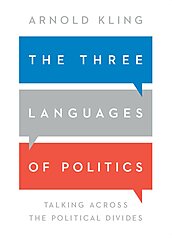This book could not be timelier, as Americans—whether as media pundits or while conversing at a party—talk past one another with ever-greater volume, heat, and disinterest in contrary opinions.
Progressives, conservatives, and libertarians are like tribes speaking different languages. Political discussions do not lead to agreement. Instead, most political commentary serves only to increase polarization. The Three Languages of Politics is an accessible, precise, and insightful guide to lowering the barriers coarsening our politics. This is not a book about one ideology over another. Instead, it is a book about how we communicate issues and ideologies and how language intended to persuade instead divides.
Arnold Kling offers a way to see through our rhetorical blinders so that we can incorporate new perspectives, nuances, and thinking into the important issues we must together share and resolve.
